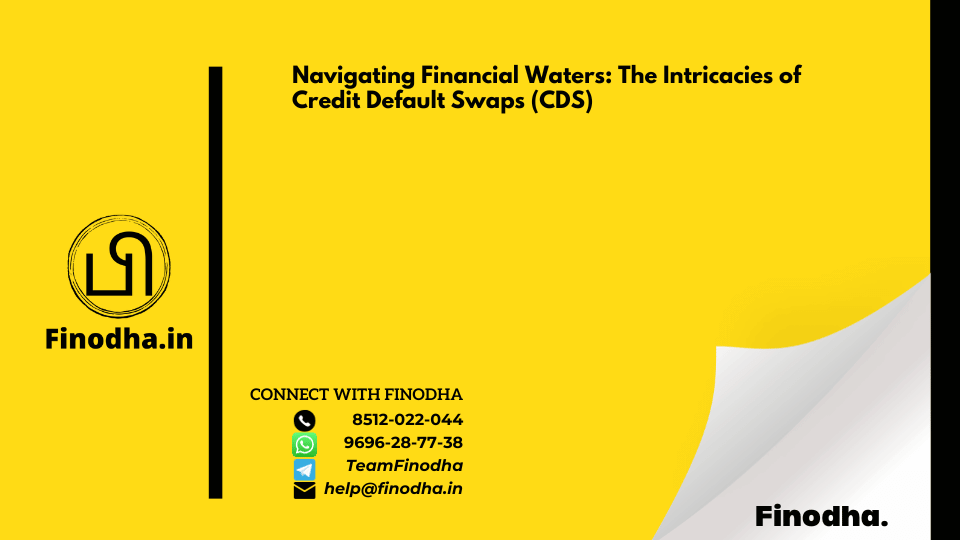Important Keywords: Credit Default Swaps, CDS Market, Risk Management, Financial Instruments, Portfolio Diversification, Market Liquidity, Credit Events, Financial Stability, Indian Investors, Global Investments.
Table of Contents
Introduction:
In the intricate world of finance, Credit Default Swaps (CDS) emerge as a tool initially designed to transfer credit exposure among banks. However, the evolution of Credit Default Swaps has propelled it beyond a risk management instrument, turning it into a dynamic player in portfolio management. This article unravels the nuances of Credit Default Swaps, exploring their origin, functionalities, and their role in shaping the dynamics of credit spreads.
Advantages and Disadvantages of CDS:
Advantages:
- Risk Transfer Mechanism: Credit Default Swaps serves as a mechanism for transferring credit risk from one party to another, providing a safety net against potential defaults.
- Portfolio Risk Management: Investors utilize Credit Default Swaps to lower risks in bond investments by redistributing risk exposure, fostering a more balanced and resilient portfolio.
Disadvantages:
- Complexity: The intricacies of CDS can be challenging for those unfamiliar with financial derivatives, potentially limiting accessibility and understanding.
- Market Volatility Impact: CDS performance is intertwined with credit spreads, exposing investors to the volatility of market conditions.
Understanding Credit Default Swaps:
Credit Default Swaps function as contracts between a protection buyer and a protection seller. Acting akin to insurance contracts, investors often procure Credit Default Swaps to shield themselves against defaults. This arrangement facilitates risk transfer in bond investments, where one party assumes the risk, and another party acquires it. The protection seller, who owns the underlying credit asset, pays a periodic fee to the buyer. If a default occurs, the protection buyer receives compensation, equal to the face value of the bond, from the seller. In the absence of a credit event, the protection seller remains exempt from making any payment.
Potential Questions Addressed:
Q: How do Credit Default Swaps impact the economy?
A: While Credit Default Swaps primarily serve as risk mitigation tools, their impact on the financial stability of the economy is significant. They cover risks such as defaults, bankruptcies, and credit rating downgrades, influencing broader economic health.
Q: What are the sectors within the credit swap market?
A: The credit swap market comprises single credit CDS, Multi-credit CDS, and CDS index, each catering to specific risk management needs.
Q: Can Credit Default Swaps be used for foreign investments?
A: Yes, CDS provides investors with the opportunity to invest in foreign credits, enhancing portfolio diversification.
Relatable Example for an Indian Audience:
Imagine Ravi, an investor based in Mumbai, keen on diversifying his investment portfolio. Concerned about potential defaults impacting his bond investments, Ravi explores Credit Default Swaps. By incorporating CDS into his strategy, Ravi hedges against credit risks, ensuring a more resilient and balanced portfolio that aligns with his financial goals.
Key Insights:
- Risk Mitigation: Credit Default Swaps serve as a robust tool for mitigating credit risks, offering investors a safety net against potential defaults.
- Market Liquidity: CDS enhances market liquidity in bonds, fostering a more dynamic and accessible environment for investors.
- Global Investment Opportunities: Investors can leverage CDS for foreign credit investments, broadening their horizons and diversifying their portfolios.
Conclusion:
Credit Default Swaps stand as a testament to the ever-evolving landscape of financial instruments. While their complexity may pose challenges, their potential advantages in risk management and portfolio diversification make them a valuable tool for astute investors navigating the intricate currents of the financial world.
Read More: Cloud Mining Unveiled: Navigating the Cryptocurrency Frontier
Official Income Tax Return filing website: https://www.incometax.gov.in/iec/foportal/
Official GST common portal website: https://www.gst.gov.in/




